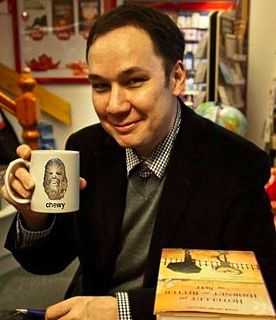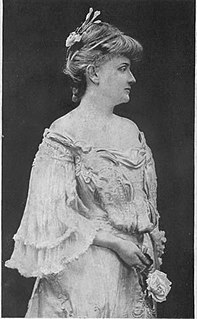A Quote by Leo Tolstoy
What is now happening to the people of the East as of the West is like what happens to every individual when he passes from childhood to adolescence and from youth to manhood. He loses what had hitherto guided his life and lives without direction, not having found a new standard suitable to his age, and so he invents all sorts of occupations, cares, distractions, and stupefactions to divert his attention from the misery and senselessness of his life. Such a condition may last a long time.
Quote Topics
Related Quotes
From a town known as Wheeling, West Virginia Rode a boy with a six-gun in his hand And his daring life of crime made him a legend in his time East and west of the Rio Grande. Well, he started with a bank in Colorado In the pocket of his vest a Colt he hid. And his age and his size took the teller by surprise, And the word spread of Billy the Kid.
He is not famous. It may be that he never will be. It may be that when his life at last comes to an end he will leave no more trace of his sojourn on earth than a stone thrown into a river leaves on the surface of the water. But it may be that the way of life that he has chosen for himself and the peculiar strength and sweetness of his character may have an ever-growing influence over his fellow men so that, long after his death perhaps, it may be realized that there lived in this age a very remarkable creature.
When an individual passes from one period of life to another a time comes when he cannot go on in senseless activity and excitement as before, but has to understand that although he has out-grown what before used to direct him, this does not mean that he must live without any reasonable guidance, but rather that he must formulate for himself an understanding of life corresponding to his age, and having elucidated it must be guided by it. And in the same way a similar time must come in the growth and development of humanity.
The aim of education is to develop resources in the child that will contribute to his well-being as long as life endures; to develop power of self-mastery that he may never be a slave to indulgence or other weaknesses, to develop [strong] manhood, beautiful womanhood that in every child and every youth may be found at least the promise of a friend, a companion, one who later may be fit for husband or wife, an exemplary father or a loving intelligent mother, one who can face life with courage, meet disaster with fortitude, and face death without fear.
It seldom happens that a man changes his life through his habitual reasoning. No matter how fully he may sense the new plans and aims revealed to him by reason, he continues to plod along in old paths until his life becomes frustrating and unbearable-he finally makes the change only when his usual life can no longer be tolerated.
And because the condition of Man, (as hath been declared in the precedent Chapter) is a condition of Warre of every one against everyone; in which case every one is governed by his own Reason; and there is nothing he can make use of, that may not be a help unto him, in preserving his life against his enemyes; It followeth, that in such a condition, every man has a Right to every thing; even to one anothers body.
The man of true genius never lives before his time, he never undertakes impossibilities, and always embarks on his enterprise at the suitable place and period. Though he may catch a glimpse of the coming light as it gilds the mountain top long before it reaches the eyes of his contemporaries, and he may hazard a prediction as to the future, he acts with the present.




































